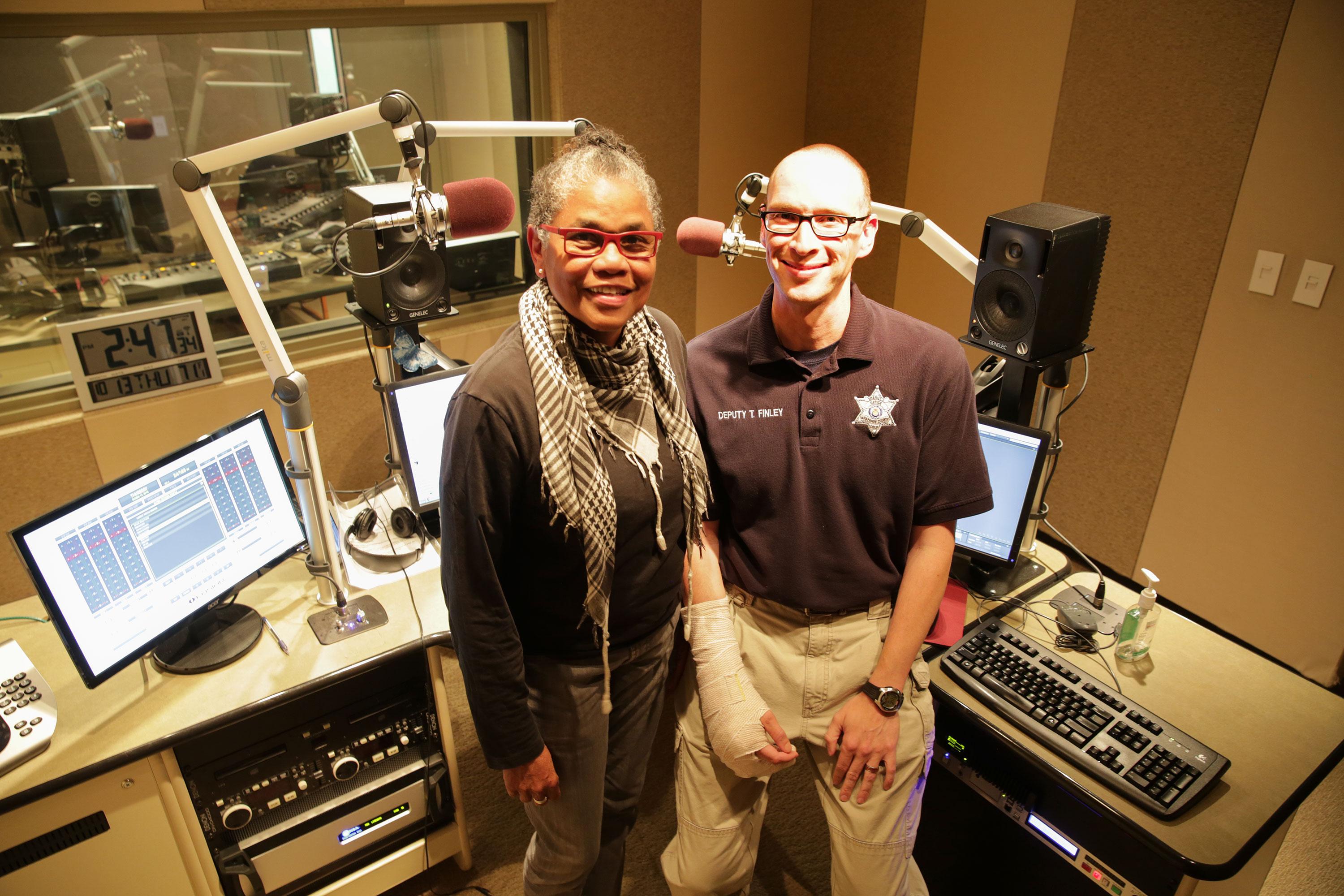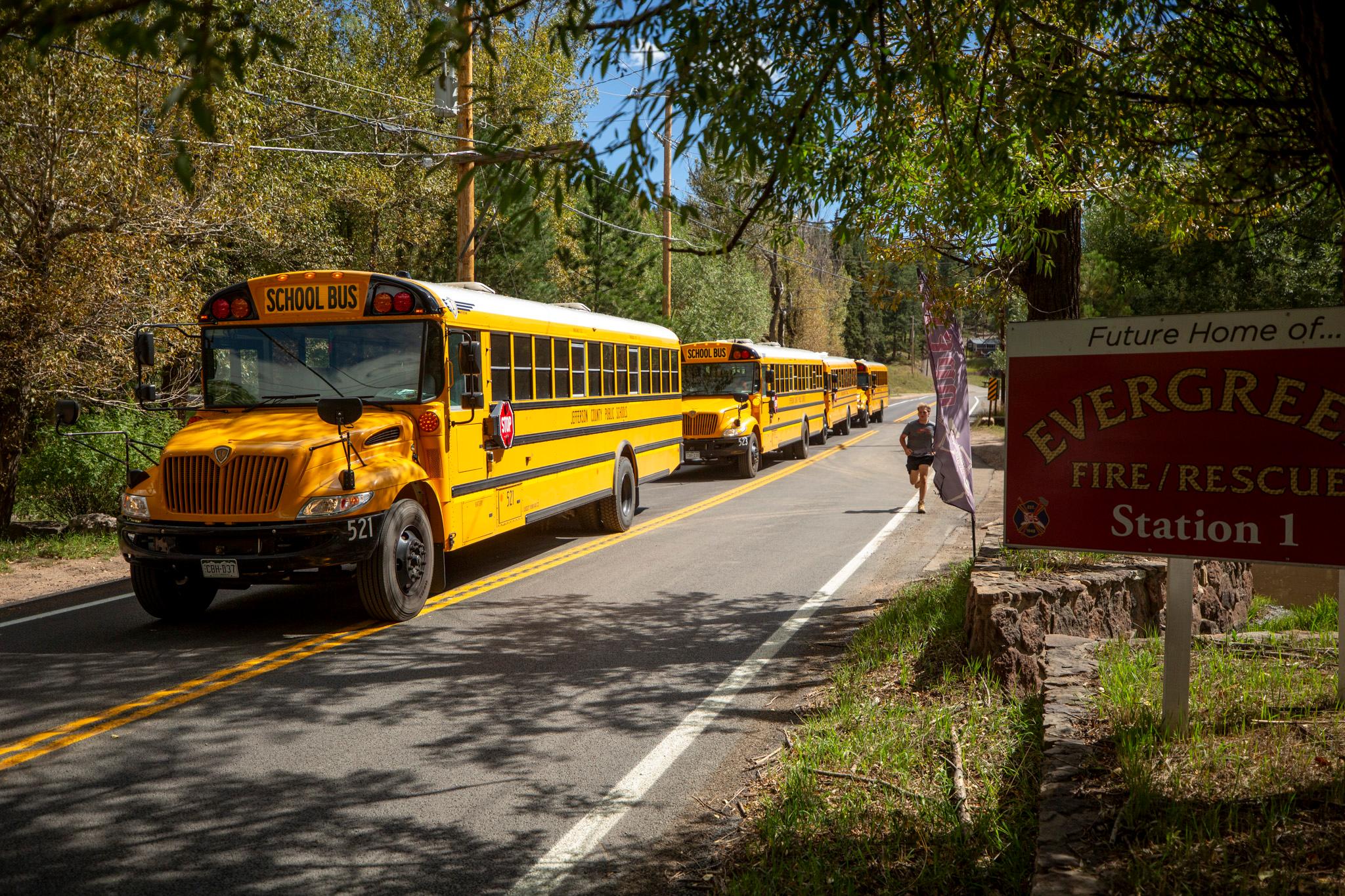
What happened when an Arapahoe County sheriff's deputy stopped an African-American citizen on Sept. 20 in the Denver Tech Center didn't make the news -- but is still noteworthy.
The encounter began with a 911 call from a woman who said she saw a “black man, black in dress, carrying a -- I assume -- a rifle.” Arapahoe County sheriff’s deputy Tom Finley just happened to be near the sighting and saw the person -- who wasn't a man, but rather a woman. And you might recognize her from the distinctive way she introduces herself each day: "This is Colorado Public Radio News. I'm Jo Ann Allen."
Our colleague, Jo Ann Allen, is host of CPR News' All Things Considered. The object in question also wasn't a rifle, but golf clubs rising from a portable carrying case.
“I heard someone say, ‘sir, drop the rifle,’ and I slowly turned, threw the golf clubs away from my body, and held out my arms, and said, ‘They're golf clubs. They're golf clubs,’” Allen said.
In recounting the situation, Allen noted that deputy Finley slowly approached her with his hand on his firearm, but when he saw the golf clubs, he took his hand off his gun. He then was apologetic, Allen thinks Finley’s exact words were, “I apologize for challenging you. When we get a call like this, we have to respond.”
Recent events between African-Americans and the police did come to Allen’s mind as she thought “oh, is this gonna happen to me in Centennial, Colorado?” After Finley stopped her, and the mistake was discovered, the two had a brief conversation. But later, both realized how differently things could have gone.
"Well, I thought, 'What if he had shot me, and I died,'" Allen said. "I'm thinking that, because my father is 101 years old, and I just couldn't imagine him getting that news."
For deputy Finley, who has been in situations with armed subjects before, it was a question of “what if it had gone really poorly” and later finding out it was just golf clubs. He didn’t feel threatened by Allen, but reflecting on it later felt nervous about it.
“I told my wife about what happened, and even before I went home, I told a couple of fellow officers about what had happened,” Finley said. “They all were supportive of, you know, said that they thought it sounded like I had done a good job, and I kinda talked more about, you know, the what-ifs.”
Conversation Excerpts With Jo Ann Allen And Tom Finley
Allen On Her Initial Reaction:
"You know, as a skeptical reporter, I was really amazed at how he handled the situation. I was stunned. My heart was racing. I didn't quite know what to do next. I totally understood why I was stopped, because if you see the (carrying case)... It looks like a gun. I can totally see that."
Finley On His Stress Level During The Encounter:
"I don't recall being specifically stressed during the incident. I'm sure that I was, but afterwards I definitely remember having the adrenaline dump and everything like that afterwards...You have adrenaline that actually helps you function better, but then after the situation, the adrenaline wears off and your heart races and you start getting sweaty. Even sometimes your fingers will, you know, feel a little shaky."
Allen On African-Americans Interacting With The Police:
"I have always been taught to obey whatever an officer tells you to do, and so, you know, I was trying to be as calm as possible and did exactly what he said ... I was taught by my parents and I think a lot of black kids, especially, know that they should, no matter what the officer is telling you to do, you should do it. The black community will call on the police when we need them. You know, it's not like the police were always the enemy, but if you were individually stopped by one, then you should be extra careful to do what they tell you to do."
Finley On His Own 'What If' Questions:
"What if [speaking to Jo Ann Allen] you hadn't complied and, you know, dropped the golf clubs, what I thought was the rifle? What if it had gone really poorly and I had shot you and then found out they were golf clubs? I mean, that was something I talked about with one of my really good friends and how terrible that would have been."
Related:
Ryan Warner: This is Colorado Matters from CPR News. I'm Ryan Warner. Our first story is about a police encounter that did not make the news, involving an Arapahoe County sheriff's deputy, who's white, and an African American civilian. Here's some of the 9-1-1 call that sparked the interaction. It came in last month, the morning of Tuesday, September 20th. 9-1-1 Dispatcher: Arapahoe 9-1-1, what's the location of your emergency? Woman: I just— well, I'm driving right now, but there was a— I've just got on I-25 going southbound from Dry Creek, and it's by the RTD Park-N-Ride. There was a black— he was a black man, black in dress, carrying a I assume a rifle. 9-1-1 Dispatcher: Okay. Woman: I don't know if it's nothing or if he's going somewhere to do something, you know what I mean? You just don't see guys carrying rifles around anymore like that, you know? RW: So someone called into report a black man with a rifle. This is near a convenience store in the Denver Tech Center. Arapahoe County Sheriff's Deputy Tom Finley picks up the story. Deputy Tom Finley: I was just at 7-11 taking a short little break in my shift, when I heard the alert tone, which is kind of a loud tone that they play over the radio for emergency calls to get everyone's attention. So I heard the alert tone and then they aired a person with a rifle at I-25 and Dry Creek. And I'm like, well, gee, I'm kind of at I-25 and Dry Creek right now. So you know, I kept listening to the call and got the description of the person, which from the 9-1-1 call was a black male, wearing black clothing, carrying a rifle of some sort. I was in an unmarked police car sitting at the gas pumps and I saw that person kinda walking diagonal through the 7-11 parking lot, and I'm like that might be the person that, you know, we're getting the call about. I exited my patrol car, shouted, you know, I believe I shouted, sir, drop the rifle. RW: To be clear, you can carry a rifle in Colorado, correct? That act, in and of itself, is not illegal. TF: That is correct. RW: So why, why do you think there was the dispatch? TF: I think it's not a common thing to see. And so, whether or not it had turned out to be a criminal violation or not, you know, we would determine when we got there. But I think the person that saw it was alarmed by what they saw. RW: The man carrying what appeared to be a rifle wasn't a man at all. It was a woman and you might recognize her voice. Jo Ann Allen: This is Colorado Public Radio News. I'm Jo Ann Allen. RW: Yes, it was our All Things Considered host, Jo Ann Allen, but she wasn't carrying a gun. Here's her side of the story. JA: I heard someone say, sir, drop the rifle, and I slowly turned, threw the golf clubs away from my body, and held out my arms, and said, “They're golf clubs. They're golf clubs.” The deputy slowly approached me and with his hand on his gun, prepared, as you might expect, slowly approached me, but when he saw it was golf clubs, he took his hand off his gun. I think his exact words were, “I apologize for challenging you. When we get a call like this, we have to respond.” You know, as a skeptical reporter, I was really amazed at how he handled the situation. I was stunned. My heart was racing. I didn't quite know what to do next. I totally understood why I was stopped, because if you see the clubs. RW: And we have a photo at cprnews.org so you can see what this club in its case looks like. JA: It looks like a gun. I can totally see that. RW: Deputy, do you remember at least reaching for your gun? TF: Yes, I do remember that I had my hand on my gun. RW: And is that part of your training, that in a situation that could escalate, you do that? TF: Yes. I need to be prepared in case she did have a rifle and was planning to do bad things with it. RW: And yet, as Jo Ann tells the story, you were really very calm. It wasn't aggressive or something like that. Take us into your mind. JA: Yeah, that's what I want to know. What were you, what were you feeling? You were approaching someone who might have a rifle. TF: You know, I, that's one of the things we train, too, is to be calm in crisis situations, because if you're out of control yourself, you're gonna do more harm than good. We do a lot of, you know, shoot, don't shoot type of training at the range, where, you know, they train the calm into you basically. RW: Have you been a situation like this before? TF: I don't think specifically like this one, but I have dealt with armed subjects before. I mean, you definitely fall back on the training when you get into stressful situations. JA: And how stressed were you? TF: I don't recall being specifically stressed during the incident. I'm sure that I was, but afterwards I definitely remember having the adrenaline dump and everything like that afterwards. JA: What's an adrenaline dump? TF: Well, so after, you know, a stressful situation, during the situation, you have adrenaline that actually helps you function better, but then after the situation, the adrenaline wears off and your heart races and you start getting sweaty. Even sometimes your fingers will, you know, feel a little shaky. JA: I felt something similar to what you felt. It wasn't until after the event was over and after I'd gotten to work here at CPR that I felt nerves and that I thought back on the actual scene several times in my mind's eye. And as the day wore on and by six o'clock that evening, I was really almost not quite a wreck, but I was closer to being a wreck than I had been during our actual encounter. And after the fact, you realize, oh, my goodness, this really could have gone badly. RW: I wonder if that's it for both of you is that after the situation, you have the room to imagine how differently it could have turned out. JA: I definitely was thinking that. Were you thinking that? TF: Yeah, I was, I was thinking about that, too. JA: I was thinking of it in the context of what had just happened the Friday before in Tulsa, the shooting there, because you and I encountered each other the following Tuesday. And before knowing about the shooting in Charlotte, that was the very day that the shooting in Charlotte happened. RW: And this is white officers shooting black civilians? JA: Right, right. But I never, I never felt a real threat from you, but thinking back later, I felt nervous about it. RW: And deputy, was that on your mind, too? The events in this country? TF: In the moment, no. I don't think you can think about stuff like that, because you don't want to second-guess yourself in the moment. RW: Jo Ann? JA: While I was standing there with my arms out, I did think about it. And I thought, oh, is this gonna happen to me in Centennial, Colorado? RW: What is “this”? Is “this” going to happen to me? JA: Am I gonna be shot by a police officer? And I have always been taught to obey whatever an officer tells you to do, and so, you know, I was trying to be as calm as possible and did exactly what he said. Now, if you had been aggressive with me, I don't know what I would have thought or felt or done, but as a black person, I was definitely thinking about the shootings that have happened in this country recently. RW: Jo Ann, you said you were taught about how to interact with police. Can you just say more about that? JA: Well, I was taught by my parents and I think a lot of black kids, especially, know that they should, no matter what the officer is telling you to do, you should do it. The black community will call on the police when we need them. You know, it's not like the police were always the enemy, but if you were individually stopped by one, then you should be extra careful to do what they tell you to do. I did want to ask the officer the line “I apologize for challenging you.” Is that something that you say or is it something you were taught in your training to say? TF: I wasn't taught that, and I honestly don't know if I've ever even said it before. JA: Seriously? TF: Seriously. JA: Because when you said it, I thought it was— I thought now this guy's been trained well. But it was you. TF: I think it was— I think it was more, it went from being a black man with a gun to being a black woman with golf clubs. And so, I was almost feeling bad about having shouted at you. RW: You ever gonna carry those golf clubs again? JA: Not— not in that way. No, I mean, ever since that incidence I have taken those clubs out of that case. And if I'm carrying clubs, they're gonna be— they are clearly seen as golf clubs, because I never know if someone else, not a police officer necessarily, but someone else might wanna take the law into their own hands. RW: Do you have any other questions for each other? JA: I have one for you. TF: Okay. JA: When the day was done and you were off-duty and you got home, did you tell anybody about what had happened? TF: Yeah, I told my wife about what happened, and even before I went home, I told a couple of fellow officers about what had happened. JA: And what did they say? TF: You know, they all were supportive of, you know, said that they thought it sounded like I had done a good job, and I kinda talked more about, you know, the what-ifs. You know, what if you hadn't complied and, you know, dropped the golf clubs, what I thought was the rifle? What if it had gone really poorly and I had shot you and then found out they were golf clubs? I mean, that was something I talked about with one of my really good friends and how terrible that would have been. JA: Well, I thought, what if he had shot me and I died? And I'm thinking that because my father is 101 years old, and I just couldn't imagine him getting that news. RW: Do you think, for either of you, is there a lesson here that perhaps would benefit, be it the police community, be the civilian community, the African American community, I don't know, are there takeaways? TF: Just, you know, try to be calm and if a police officer's shouting at you to do something, maybe that's not the best time to argue. You know, follow what the officer's telling you first and then sort through it, you know, after. RW: Sort through it. Because I think one element of this is assumption, right. A lot of it was assumed about the situation before you actually knew what was going on with each other. TF: I didn't get to drive there thinking about, okay, what am— how am I gonna approach this person? I didn't get to drive there with my lights and sirens on, which gets, you know, the adrenaline up and everything. It was just like, oh, hey, right there. You know, like, I guess I should go talk to that person and— JA: Because also lights and sirens would have scared the person you're going after, too, which could have made me— could have gotten me amped up. TF: Yeah, you're right. I mean, if you're just walking and I come, you know, coming up to you with my lights and my sirens on and stop right in front of you or right behind you or something like that, you're right, that would— JA: I would've been a lot more afraid. TF: Exactly. RW: Deputy, did Jo Ann's race ever enter your mind? TF: Only to describe her. Meaning, the call came in as a black male, so I was looking for a black male. That was the only way it played any, any role in my response was just who am I looking for? RW: I do wonder if it had been a white person carrying the golf bag, if it would've been interpreted any differently. TF: I don't think so. Maybe by the person that called, but I don't believe so by me. I believe I would've reacted the same way. I just would've been looking for a different person. JA: I was wondering if this changed you in any way? TF: I don't think so. RW: Jo Ann, did it change you? JA: I don't think so either, except to be grateful that I can have an encounter with a police officer that goes well, even though I did have something— I looked threatening. RW: Deputy Finley, Jo Ann Allen, thanks for being with us. TF: Thank you. JA: Thank you, Ryan. And thank you, Deputy Finley. |








